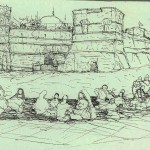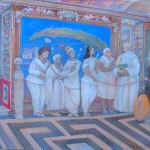Welcome back to What Smart Women Read! It’s been five years since my last post, and I have decided to re-launch my periodic reflections on the power of literature. One of my motivations to get this going again was a line I read in Abraham Verghese’s The Covenant of Water (it’s quite good by the way, but Cutting for Stone is still my favorite). He writes, “Fiction is the great lie that tells the truth about how the world lives.” Like most of you, I find meaning in the stories we read, especially when they resonate with the big themes of being human, such as love, jealousy, greed, suffering, cruelty, and, of course, power.
Verghese also says, “One writes to know what one is thinking.” This is part of the reason why I spend time creating these posts. I find that as I capture my thoughts on ‘paper’, it cements my understanding of what an author is trying to convey. Hopefully, I can then share something meaningful with you.
I’ve been thinking about why I read, and a few ideas come to mind. You might ask yourself why you read as well.
- To grow: To learn about more lives than I can possibly know in one lifetime.
- To be transported: To travel to another place and time and feel the power of history.
- To develop empathy: To build my emotional capacity for understanding the struggles others face and often put my own into context
- To think: To stretch my mind, especially when reading complex text, and look back and forth over words to know how to interpret what is being conveyed
- To be discriminating: To decide for myself what has value (without feeling obliged to agree with critics or fellow readers). I will be writing my next blog on this, what I often describe as “Maybe it’s me,” a way of apologizing for not loving a book when everyone else seems to.
Part of the excitement from 2023 was joining the the Fox Trails “Small, but Mighty” Reading Group. I recently moved to Asheville and wanted to continue to spend time with fellow readers. Since I am fortunate to live in a neighborhood with some wonderful women, I am continuing to learn and grow while sharing my impressions with them. My favorite so far has been James McBride’s The Heaven and Earth Grocery Store, but Barbara Kingsolver’s Demon Copperhead is also worthwhile. And if you enjoy novels with a strong sense of history, check out The Trackers and The Four Winds. I’m sure you are familiar with Charles Frasier and Kristin Hannah, respectively, and while these are lesser known titles, they are good reads.
Here’s the complete list of our 2023 selections:
- Demon Copperhead by Barbara Kingsolver
- Four Winds by Kristin Hannah
- Hello Beautiful by Ann Napolitano
- The Trackers by Charles Frazier
- The Daughter of Doctor Moreau by Silvia Moreno Garcia
- Killers of the Flower Moon by David Grann
- The Heaven and Earth Grocery Store by James McBride
- Tom Lake by Ann Patchett
- The Cove by Ron Rash
I hope that you continue to read my blog and let me know what you think about my posts. More importantly, I want to hear about what you are reading! More to come in 2024….

 I fell in love with reading in the first grade. If you were well-behaved, you earned the privilege of sitting outside the classroom in a reading circle. We would take turns reading aloud, and I remember the thrill of hearing the words coming off the page and from my mouth. From that moment on, I read everything I could get my hands on.
I fell in love with reading in the first grade. If you were well-behaved, you earned the privilege of sitting outside the classroom in a reading circle. We would take turns reading aloud, and I remember the thrill of hearing the words coming off the page and from my mouth. From that moment on, I read everything I could get my hands on.
